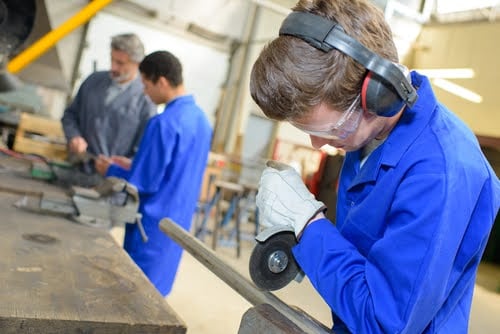
For decades, the traditional four-year college degree has been considered the default path to success. But today’s job market tells a different story. Skilled trades and vocational training offer fulfilling, future-ready career paths without the burden of student debt.
As tuition at colleges and universities continues to rise, many students and families are rethinking what “success” really means. With growing demand in fields like plumbing, HVAC, and electrical, trade schools are gaining new attention as a smart, cost-effective alternative. These career paths offer job security, hands-on learning, and real-world experience from day one.
Trade schools and vocational programs provide targeted training in specific career paths, often in less time and at a fraction of the cost of a four-year degree. On average, trade school costs range from $5,000 to $15,000 per year, compared to $25,000–$60,000 per year at traditional colleges.
Plus, many students can earn while they learn through apprenticeships and on-the-job training.

While networking at a four-year university may feel broader, trade schools offer more targeted, career-focused connections—often linking students directly with employers in their chosen field. Choosing a trade means defining your own career goals on your own terms.
There are many different trade schools and programs that focus on skilled trades such as:
Electrical trade schools teach students how to install, maintain, and repair electrical systems in residential, commercial, and industrial settings. Courses cover everything from wiring and circuitry to safety codes and blueprint reading.
With the growing need for energy-efficient systems and infrastructure updates, electricians are in high demand—and this field offers strong earning potential and opportunities for specialization, such as solar energy or automation systems.
Plumbing and pipefitting programs prepare students to work with water, gas, and waste systems in homes, buildings, and industrial facilities. These programs teach system design, troubleshooting, and installation techniques—along with vital knowledge of building codes and safety regulations. Plumbers and pipefitters often begin as apprentices and can work their way up to become licensed master plumbers or even run their own businesses.

HVAC programs offer training in climate control systems that are critical to indoor comfort and air quality. Students learn to install, maintain, and repair heating and cooling systems, including furnaces, air conditioners, and ventilation systems. As energy efficiency and smart home technology continue to evolve, HVAC technicians play an essential role in sustainable building practices. Many programs also include EPA certification for handling refrigerants—a requirement for most HVAC roles.
Welding schools train students in techniques for joining and shaping metal using various tools and methods like MIG, TIG, and arc welding. Fabrication skills are used in industries ranging from automotive and aerospace to construction and manufacturing. This highly practical field values precision and craftsmanship, and skilled welders are often able to work on large-scale infrastructure projects or transition into supervisory or inspection roles.
Construction management programs blend hands-on trade knowledge with leadership and project coordination skills. Students learn about construction methods, building codes, budgeting, and team supervision.
This pathway is ideal for individuals who want to combine technical know-how with strategic planning, and it can lead to roles such as site supervisor, estimator, or project manager. As construction projects grow more complex, the demand for trained managers continues to rise.

Each of these vocational training options offers a guided, goal-oriented career path with real potential for advancement. Whether you’re drawn to hands-on problem-solving, technical systems, or leadership roles, the skilled trades have a place for you to grow—and thrive.
Skilled trades are the backbone of our communities. From maintaining electrical systems to ensuring safe heating and cooling in homes, these careers are absolutely essential (and growing).
At Explore The Trades, we believe that jobs in the skilled trades aren’t a plan B. They’re smart, future-proof options that deserve just as much attention and respect as any college-bound route.
Take the first step toward a rewarding, hands-on career! Take our career quiz to see which trade is the best fit for you.